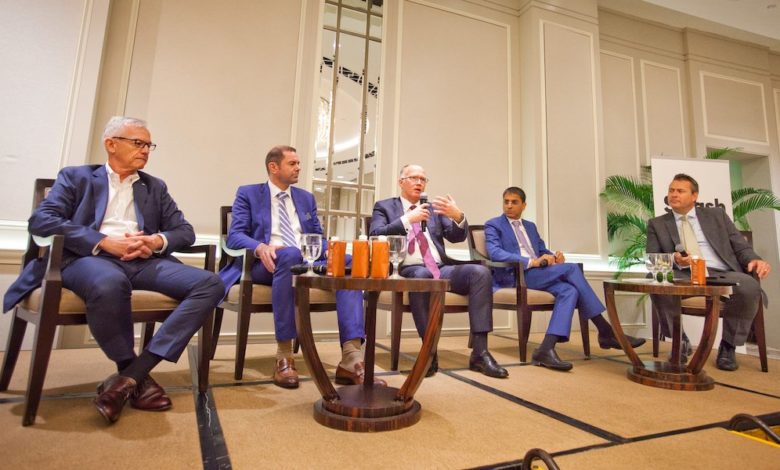Maritime CEO Forum Singapore: Shipmanagement in the 2020s

How should shipmanagers position themselves as service providers in the 2020s? Last week’s Maritime CEO Forum in Singapore served as an ideal sounding board to assess how managers must transform to stay relevant, carrying on a conversation that had been started earlier in the year with the publication of Splash’s wide-ranging shipmanagement annual report.
The business model of shipmanagement has been the same for nearly half a century – it will face some kind of disruption soon, Carl Schou, the president and CEO of Wilhelmsen Ship Management, told delegates.
“I think there will be other businesses that will try and get a large piece of the pie,” Schou said.
Schou said economies of scale were paramount in his business in order to to build competencies to face the growing regulations coming shipping’s way, with smaller managers facing a challenge to build up this competence.
There will be other businesses that will try and get a large piece of the pie
Vinay Gupta, CEO of Union Marine Management, agreed up to a point, saying managers needed to keep up with all the new fuels and skillsets to manage the future assets of owners, while still retaining a personalised, customised service.
“In the future we need to be more than a service provider, we need to be a value-added partner into their business so whatever fees our clients are paying they should get back – perhaps even more – in value,” Gupta said.
Taking place on World Maritime Day, which this year had a focus on new technologies for greener shipping, the session questioned whether all the new tech coming onboard ship was developed with sufficient feedback from the end user, namely the world’s seafarers.
Conceding that many equipment user interfaces were often poor, Olav Nortun, CEO of Thome Group, said seafarers should be invited to train ashore far earlier, and that development training onboard was still not good enough.
“How to move training from theoretical – from simulators – to the real thing is a step we have not yet taken as an industry,” Nortun said.
New technology must be created in tandem with subject matter experts, stressed John-Kaare Aune, the CEO of Wallem Group, adding that managers must bring the right team in to test any gear in-house before rolling them out to the ships.
“I definitely hear it that seafarers would like to be there at the start of the process – and we as shipmanagers wish we could be heard more by IMO and regulators – to have a bigger voice at IMO — or regulators could have a bigger ear sometimes,” Aune said.
Greater standardisation would help, according to Wilhelmsen’s Schou, pointing out by way of an example how a seafarer needs a different certificate for each different type of ECDIS.
This discussion brought the session neatly on to crew welfare and the thorny issue of how to impart the bonuses of having happy crews to clients.
A happy crew performs better creating better efficiency and an improved quality of maintenance, said Wallem’s Aune. However, he admitted that there are some owners who have a stronger focus on the cost aspect and may not be as open to some of the welfare points he and his peers offer.
“It does make for an awkward conversation sometimes,” Aune admitted, saying it was important to bring up statistics to show what a good investment in crew can bring overall.
The real challenge when it comes to crew welfare comes with the charterers, not the owners, something that was more acute during the covid pandemic, Thome’s Nortun maintained.
The Thome boss said a complete rethink was required when it comes to recruitment – the length of time onboard, the structure and hierarchy at sea, all this was anathema to getting a new generation to sign up for a career working on ships.
Aune agreed that post-covid it was proving more difficult to source crew. The pandemic had not been a “positive mirror” on the industry, he said, adding that shore leave still remains an issue in certain parts of the world today.
This next generation discussion sparked a question from the floor with Tabitha Logan, general manager at dry bulk concern Asia Maritime Pacific and co-founder of tech talent competition The Captain’s Table, asking about new skillsets such as data science being needed on ships of the future, and where to source these people from.
Wilhelmsen’s Schou said Africa was coming up as a potential source of new crew, a point of view eagerly taken up by audience member Carl Martin Faannessen, CEO of Manila-based crewing specialist Noatun Maritime, who told attendees that according to studies he had been involved in once a country’s GDP per capita per year enters the $12,000 to $15,000 zone on a PPP basis, this tends to be the moment where sourcing ratings becomes difficult.
“So for the Philippines, India and Indonesia that means we do not have a lot of time,” Faannessen warned, adding that it typically takes between five and seven years to to go from zero to a stable source of crew in a new sourcing nation. Acknowledging the needs to source crew with decent English, a high level of compatibility, in relatively stable countries, where high unemployment can be a bonus, Faannessen selected Kenya as his top pick for new sources of crew.
“Why more people are not looking at that place is a mystery to me,” the crewing veteran told invited delegates.
Maritime CEO Forum Singapore 2022 was sponsored by Aderco, Cobham Satcom, CyberOwl, Dualog, Inmarsat, Liberian Registry, Ocean Technologies Group, SEDNA, Synergy Group, Vanir Marine, Wallem, WIZ Bulk and Zero North.
The next Maritime CEO Forum takes place at the Monaco Yacht Club on October 12 while April 24 has been announced as the date for the event’s return to Singapore, timed to coincide with the start of the city’s busy official maritime week.
